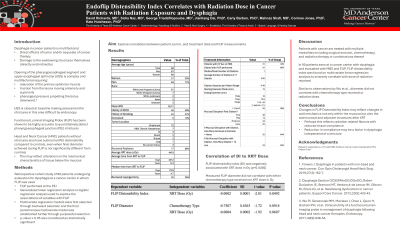Monday Poster Session
Category: Esophagus
P2233 - FLIP Distensibility Index Correlates With Radiation Dose in Cancer Patients With Radiation Exposure and Dysphagia
Monday, October 28, 2024
10:30 AM - 4:00 PM ET
Location: Exhibit Hall E

Has Audio

David M. Richards, MD
University of Texas MD Anderson Cancer Center
Houston, TX
Presenting Author(s)
David M.. Richards, MD1, Sidra Naz, MD, MPH1, Jianliang Dai, PhD2, George Triadafilopoulos, MD3, Clifton D. Fuller, MD, PhD1, Carly Barbon, PhD1, Mehnaz A. Shafi, MD1, Corinne Jones, PhD4, Katherine Hutcheson, PhD1
1University of Texas MD Anderson Cancer Center, Houston, TX; 2MD Anderson Cancer Center, Houston, TX; 3Stanford University School of Medicine, Houston, TX; 4University of Texas at Austin, Austin, TX
Introduction: Dysphagia in cancer patients is multifactorial, resulting from direct effects of tumor and/or the sequelae of cancer therapy. (1, 2) The opening of the pharyngoesophageal segment and UES is a complex multifactorial mechanism. The UES remains closed at baseline making assessment for strictures in this area difficult by endoscopy. Functional luminal imaging probe (FLIP) has been shown to be a highly accurate tool to quantitatively detect pharyngoesophageal junction (PEJ) strictures.(3) Head and Neck Cancer (HNC) patients without strictures also have subnormal PEJ distensibility compared to controls, even when final diameter achieved during FLIP was not significantly different from controls. This may reflect alterations in the mechanical characteristics of tissue below the mucosa.(3)
Methods: This is a retrospective cohort study of 90 cancer patients undergoing evaluation for dysphagia in whom FLIP was used as part of their evaluation. FLIP was performed at the pharyngoesophageal junction. Generalized linear regression analysis or logistic regression analysis were employed to explore the associations of patient or tumor characteristics with FLIP measurements. Multivariate regression models were first selected through backward selection and the final parsimonious multivariate model was established further through purposeful selection. A p-value ≤ 0.05 was considered as statistically significant. Statistical analysis was performed using R (version 4.1.1; R Foundation for Statistical Computing, Vienna, Austria) and SAS version 9.4 (SAS company, Cary, NC, USA).
Results: FLIP distensibility index (DI) was negatively associated with XRT dose in Gy (p=0.0492). FLIP measured diameter did not correlate with XRT dose in Gy.
Discussion: In our cohort of 90 cancer patients with dysphagia, FLIP distensibility index (DI) was found on multivariate linear regression analysis to correlate with dose of radiation received with an inverse association. Similar to observations by Wu et al., FLIP measured diameter did not correlate with radiation dose. We believe that this reflects changes in wall mechanics not only within the mucosa but also the submucosal strictures. This may reflect radiation related fibrosis even in the absence of stricture with reduced elasticity/compliance of these structures. The reduction in compliance may be a factor in dysphagia independent of stricture.
Note: The table for this abstract can be viewed in the ePoster Gallery section of the ACG 2024 ePoster Site or in The American Journal of Gastroenterology's abstract supplement issue, both of which will be available starting October 27, 2024.
Disclosures:
David M.. Richards, MD1, Sidra Naz, MD, MPH1, Jianliang Dai, PhD2, George Triadafilopoulos, MD3, Clifton D. Fuller, MD, PhD1, Carly Barbon, PhD1, Mehnaz A. Shafi, MD1, Corinne Jones, PhD4, Katherine Hutcheson, PhD1. P2233 - FLIP Distensibility Index Correlates With Radiation Dose in Cancer Patients With Radiation Exposure and Dysphagia, ACG 2024 Annual Scientific Meeting Abstracts. Philadelphia, PA: American College of Gastroenterology.
1University of Texas MD Anderson Cancer Center, Houston, TX; 2MD Anderson Cancer Center, Houston, TX; 3Stanford University School of Medicine, Houston, TX; 4University of Texas at Austin, Austin, TX
Introduction: Dysphagia in cancer patients is multifactorial, resulting from direct effects of tumor and/or the sequelae of cancer therapy. (1, 2) The opening of the pharyngoesophageal segment and UES is a complex multifactorial mechanism. The UES remains closed at baseline making assessment for strictures in this area difficult by endoscopy. Functional luminal imaging probe (FLIP) has been shown to be a highly accurate tool to quantitatively detect pharyngoesophageal junction (PEJ) strictures.(3) Head and Neck Cancer (HNC) patients without strictures also have subnormal PEJ distensibility compared to controls, even when final diameter achieved during FLIP was not significantly different from controls. This may reflect alterations in the mechanical characteristics of tissue below the mucosa.(3)
Methods: This is a retrospective cohort study of 90 cancer patients undergoing evaluation for dysphagia in whom FLIP was used as part of their evaluation. FLIP was performed at the pharyngoesophageal junction. Generalized linear regression analysis or logistic regression analysis were employed to explore the associations of patient or tumor characteristics with FLIP measurements. Multivariate regression models were first selected through backward selection and the final parsimonious multivariate model was established further through purposeful selection. A p-value ≤ 0.05 was considered as statistically significant. Statistical analysis was performed using R (version 4.1.1; R Foundation for Statistical Computing, Vienna, Austria) and SAS version 9.4 (SAS company, Cary, NC, USA).
Results: FLIP distensibility index (DI) was negatively associated with XRT dose in Gy (p=0.0492). FLIP measured diameter did not correlate with XRT dose in Gy.
Discussion: In our cohort of 90 cancer patients with dysphagia, FLIP distensibility index (DI) was found on multivariate linear regression analysis to correlate with dose of radiation received with an inverse association. Similar to observations by Wu et al., FLIP measured diameter did not correlate with radiation dose. We believe that this reflects changes in wall mechanics not only within the mucosa but also the submucosal strictures. This may reflect radiation related fibrosis even in the absence of stricture with reduced elasticity/compliance of these structures. The reduction in compliance may be a factor in dysphagia independent of stricture.
Note: The table for this abstract can be viewed in the ePoster Gallery section of the ACG 2024 ePoster Site or in The American Journal of Gastroenterology's abstract supplement issue, both of which will be available starting October 27, 2024.
Disclosures:
David Richards indicated no relevant financial relationships.
Sidra Naz indicated no relevant financial relationships.
Jianliang Dai indicated no relevant financial relationships.
George Triadafilopoulos indicated no relevant financial relationships.
Clifton Fuller: Elekta AB – Grant/Research Support, honoraria, travel funding. Kallisio, Inc. – Intellectual Property/Patents, holds patents licensed by the University of Texas MD Anderson Cancer Center to Kallisio, Inc.. Philips Medical Systems – travel/honoraria. Varian/Siemens – travel/honoraria.
Carly Barbon indicated no relevant financial relationships.
Mehnaz Shafi indicated no relevant financial relationships.
Corinne Jones indicated no relevant financial relationships.
Katherine Hutcheson: Atos Medical – Grant/Research Support.
David M.. Richards, MD1, Sidra Naz, MD, MPH1, Jianliang Dai, PhD2, George Triadafilopoulos, MD3, Clifton D. Fuller, MD, PhD1, Carly Barbon, PhD1, Mehnaz A. Shafi, MD1, Corinne Jones, PhD4, Katherine Hutcheson, PhD1. P2233 - FLIP Distensibility Index Correlates With Radiation Dose in Cancer Patients With Radiation Exposure and Dysphagia, ACG 2024 Annual Scientific Meeting Abstracts. Philadelphia, PA: American College of Gastroenterology.
